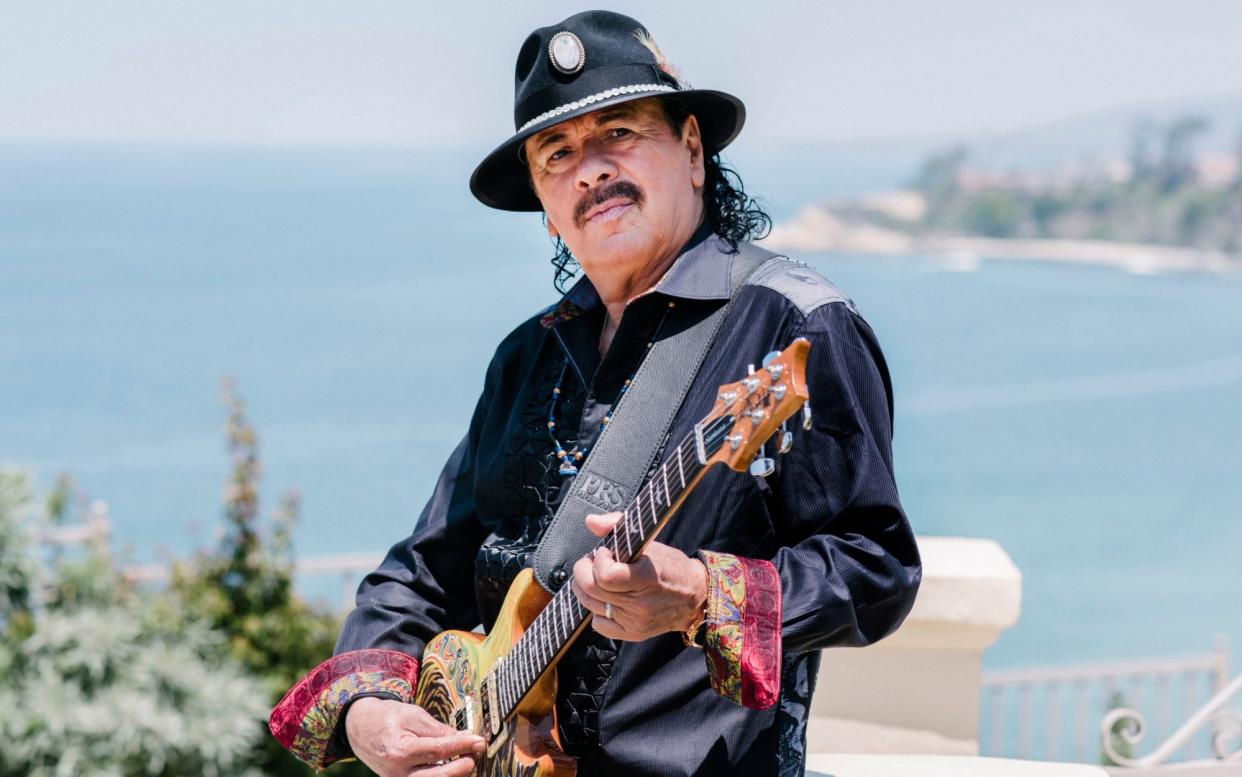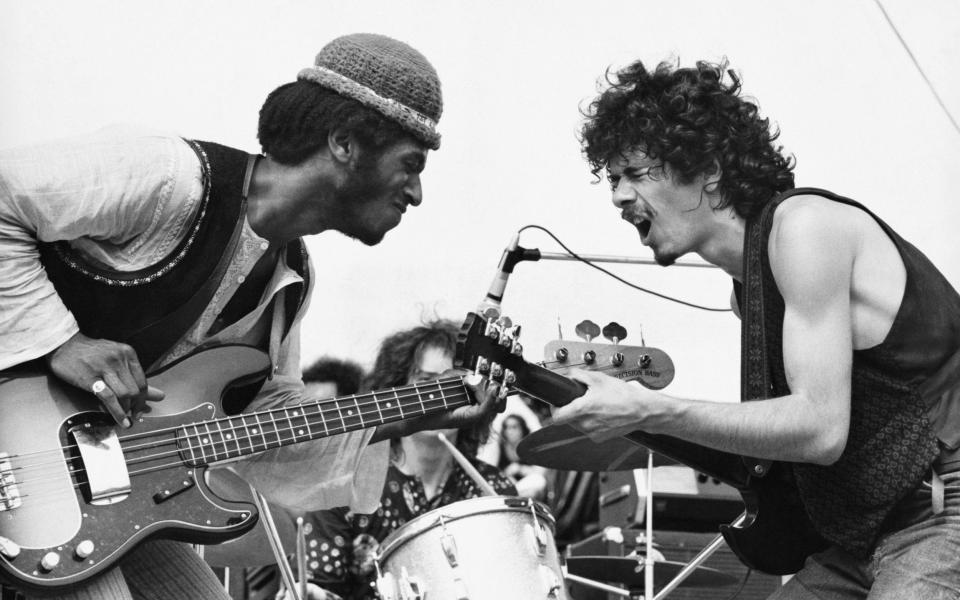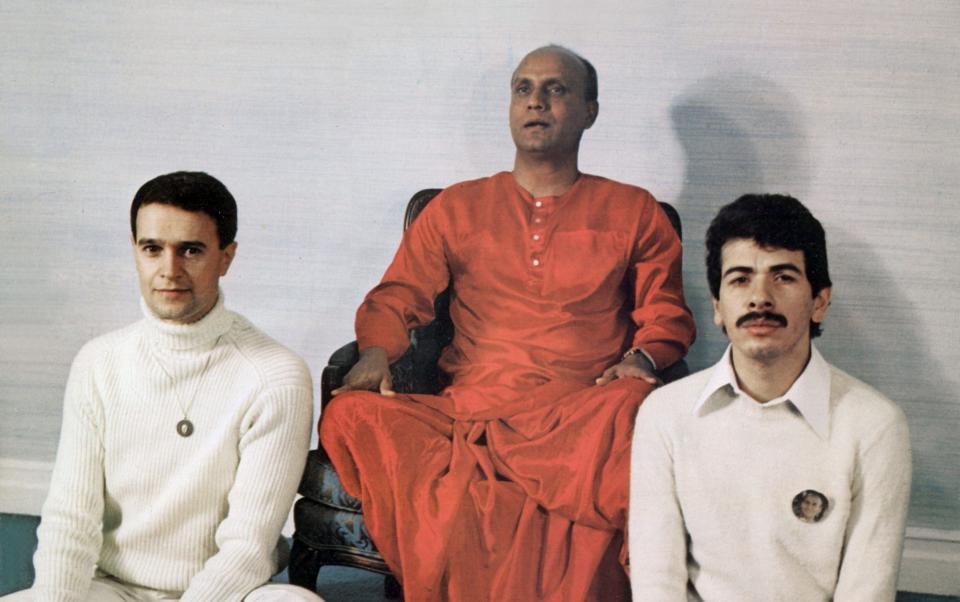Carlos Santana interview: 'The world is literally vomiting'

- Oops!Something went wrong.Please try again later.
- Oops!Something went wrong.Please try again later.
"I was in an altered state at Woodstock,” says Carlos Santana. The Mexican-American guitarist was a 22-year-old unknown in 1969 when his band Santana took the stage at the now legendary rock festival. He admits that he finds it hard to watch the documentary footage, because all he can see is his own discomfort. “It is extremely scary to be in front of 150,000 people and the neck of your guitar feels like an electric snake. All I’m thinking is, ‘God please help me stay in tune and on time’.”
Carlos had been given mescaline by The Grateful Dead’s Jerry Garcia, just before the Woodstock promoters altered the set times and ushered his band on stage. That sensational groovy and explosive performance changed everything for Santana. Their debut album came out the following month, their bold fusion of Latin and African rhythms with jazz and heavy blues rock firing Carlos into the guitar hero elite. Which begs the question of how do you actually play while in the grip of a hallucinogenic trip?
“It’s not easy,” says Santana, with deadpan understatement. “I wouldn’t recommend it.”
On the question of whether the acclaimed 74-year-old virtuoso musician still indulges in mind-altering substances, he is circumspect. “I wouldn’t call it indulge,” he responds, carefully. “I call it visiting myself from another angle. Indulge is like if you eat too much carrot cake. I don’t do that. I dive into a place where I can discover something different and new with emotion, feelings, and passion, like a meditation.”
I’m going to take that as a yes.
Carlos Santana has sold more than 100 million albums, both solo and with ever-changing line-ups of his band. The florid artwork and soaring solos of albums such as Abraxas (1970) and Amigos (1976) made Santana synonymous with psychedelic rock but he simultaneously mapped out a parallel career in jazz-fusion, working with elite musicians such as John McLaughlin and Herbie Hancock, as well as contributing sensational fretwork to some personal heroes including Bob Dylan, Aretha Franklin and John Lee Hooker.

In 1999, Santana enjoyed a spectacular resurgence with the 30 million-selling Supernatural, featuring collaborations with artists including Lauryn Hill and Eric Clapton. Latin tinged pop song Smooth, featuring vocals from Matchbox 20 singer Rob Thomas, is ranked by Billboard magazine as the second most successful song of all time in the US charts (the first is The Twist by Chubby Checker). The band’s new album, Blessings and Miracles (released last week), taps into that same spirit, spanning hip hop, heavy metal, pop, R’n’B and blues, with contributions from members of Metallica, girl group Fifth Harmony, country star Chris Stapleton, veteran British soul man Steve Winwood and the return of Rob Thomas. It was recorded during the pandemic, over Zoom, and Carlos admits he has yet to personally meet most of his collaborators. Not that this presented a problem. “There is a divine intelligence orchestrating these things to happen with me and for me, so all I have to do is show up with my guitar.”
One thing you have to get used to while talking to Santana is that he still adheres to the kind of mystical hippy values of the Woodstock generation. Chatting with me in a colourfully decorated room at his San Rafael, California, home via Zoom, his Mexican accent remains strong. With all his talk of cosmic frequencies, Carlos comes across as the last of the Fabulous Furry Freak Brothers. I honestly believe he would take that as a compliment. “People say I’m a Pollyanna Utopian, but I am still with purity and innocence. I have learned enough spiritual discipline that no matter what the world throws at me, I’m immune.” He credits his years studying with meditation guru Sri Chimnoy, though the two later fell out. “For me, music has never been about entertainment or showbiz, it’s mystical medicine.”

As an unapologetic advocate of hippy peace and love values, Santana has an interesting take on recent years of political turmoil and apparently perpetual crisis. “I’m not discouraged, because the world is literally vomiting. And, you know, when you vomit, you’re gonna feel better later, because you’re getting rid of something that doesn’t belong in your system.”
He proposes a unique solution to America’s divisions. “If I could, I would put all Americans – all of them – into a space capsule, and they can go around for a week. So they can really, really see that out there, it is just one planet.”
Santana learnted violin aged five and guitar aged eight, to play with his mariachi musician father. The family lived in Tijuana before moving to San Francisco. It was a hardscrabble existence, and he worked as a dishwasher at a burger joint for many years while busking and playing in blues bands. “When you’re washing dishes and scrubbing big pots and pans, cleaning the yard, and bleaching the floors, peeling potatoes, it’s glorious to dream that I can be on stage with BB King or Eric Clapton or Miles Davis. It’s incredible how much imagination takes you into a realm of fruition. That if you believe it, you can achieve it.”
On the subject of who is the best musician he has ever played with, he is unequivocal. “Miles Davis. The way he thought was very different than any other human being. He was the first multi-dimensional being I ever met. They can play anything, you know, from funk to classical to flamenco, and every note becomes like a pristine pure diamond. I have a feeling that when he left the body and he went to heaven, God said, ‘Hey Gabriel, come over here, give Miles that trumpet’. I truly believe that with all due respect to all the musicians that I love, Miles Davis is numero uno, here and in heaven.”
Santana’s own music spans such a huge range of styles and influences, he describes himself as a classical musician. “Classical music is not just for white people from Europe. No, Billie Holiday is classical, John Coltrane, Duke Ellington, anything that is outside of time and outside of gravity is classical music. I don’t let no one’s ignorance define me.”
Although guitars are not as prevalent in contemporary music as they were during the rock era, he believes the instrument will resurge. “There’s something about the guitar, the shape is very sensuous, the sound is sexy, especially guys who bend notes, like Albert King, Freddie King, BB King and Otis Rush, it makes women and men get chills and they cry and laugh and dance.” As for the rise of digital pop, he is dismissive. “We live in an age of lazy people, they let computers dictate for them.” He is not against technology but says musicians had something in the early days of recording that is in short supply now. “Imagination!”
As for his own frankly incredible playing, he continues to practise every day. “I don’t practise scales and chords, I take a walk on the neck of my guitar with John Coltrane or Stevie Wonder. What I’m diving into is learning how to go deeper and deeper into the note, so that you cannot not feel it. You can take a melody outside of time and gravity, then it enters eternity. That’s what real musicians do.”
Santana: Blessings and Miracles is out via BMG now.

